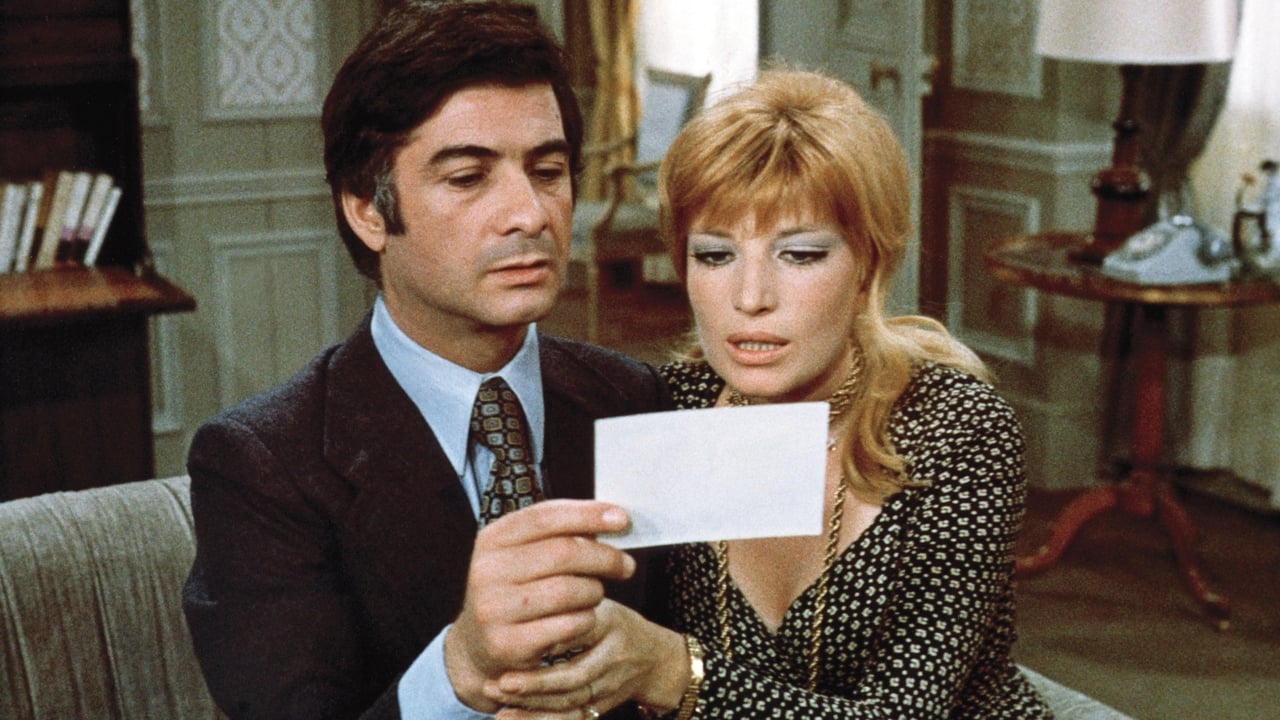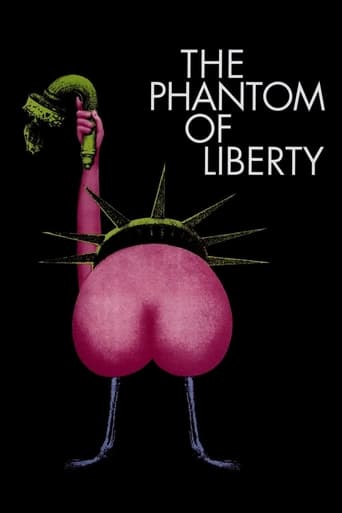Breakinger
A Brilliant Conflict
Dynamixor
The performances transcend the film's tropes, grounding it in characters that feel more complete than this subgenre often produces.
Freeman
This film is so real. It treats its characters with so much care and sensitivity.
Phillipa
Strong acting helps the film overcome an uncertain premise and create characters that hold our attention absolutely.
gavin6942
One of Luis Bunuel's most free-form and purely Surrealist films, consisting of a series of only vaguely related episodes - most famously, the dinner party scene where people sit on lavatories round a dinner table on, occasionally retiring to a little room to eat.Luis Bunuel said, "Chance governs all things; necessity, which is far from having the same purity, comes only later. If I have a soft spot for any one of my movies, it would be for The Phantom of Liberty, because it tries to work out just this theme." I know I am in the minority, but I do not quite see the appeal of Bunuel's later films. I love his early work, such as "Age d'Or" and "un Chien Andalou", but the later more political films... I do not necessary appreciate them. This one and its partner, "Discreet Charm", I just cannot identify with... maybe a second viewing?
Scott44
***User-reviewer Claudio Carvalho ("A Delicious Surrealistic Satire to the Moral and Costumes of the Society, to the Family and to the Church", Claudio Carvalho from Rio de Janeiro, Brazil, 5 May 2005) has interesting comments. Also, Hasosch ("The Dissolution of Form and Function", hasosch from United States, 19 July 2007) takes a stab at interpreting it.***"Phantom Liberty (1974, Luis Buñuel)," a surreal comment on the ruling class, is a curious, occasionally very disturbing work arranged with quality. Seemingly a nearly random series of absurd and/or awkward moments, it makes much more sense when one does not seek a linear narrative. Some cinema scholars have noted the connections it makes with the work of Italy's Pier Paolo Pasolini, who was at the time a contemporary of Buñuel's in film surrealism. (Buñuel has a character named Doctor Pasolini. Unfortunately for art house cinema fans, the highly provocative Pasolini was tragically murdered in 1975.) "Phantom Liberty" contains some ideas which can be enjoyed by many people. One of the most popular moments is when concerned parents seek help from French authorities for their missing daughter, while she is sitting nearby (and the adults all interact with her). Also, a poet-turned-sniper, initially witnessed inside a tower committing a horrific massacre of unsuspecting, random adults at street level, is subsequently tried in a formal court of law. Once the sentence of death has been delivered with stern finality by the judge, the poet-sniper is promptly freed, congratulated and treated like a major celebrity.There are also scenes that are consciously disturbing. We open with French troops executing Spanish civilians in 1808. (One of the victims is Buñuel.) Later, a young nephew seeks to fulfill his sexual urges with his considerably older, virginal Aunt. There is also the justifiably famous scene where a ruling class family meet at a large table not to dine, but to sit on and use toilets. The actors play this singularly bizarre moment straight, as if they were appearing in a mainstream movie. Some religious people will also likely find offensive the way a group of middle-aged monks relax in the evening. First, they meet to pray with an attractive woman (of the same age) in her bedroom. Later, the monks and the woman are observed playing poker like card sharks, smoking like chimneys and calling some cards "virgins." The partying monks will conclude their evening by witnessing an S & M session.Speaking of the latter, Italian siren Adriana Asti appears in two especially erotic scenes. We see her early on as a stunning, head- turning dominatrix. Later, she is a pianist performing a Brahms piano concerto liberated from the confines of all her clothing. (Warning: Please don't drive or operate heavy machinery while watching Asti seemingly tickling the ivories in her birthday suit.) Buñuel uses the naked pianist at the right time to keep the viewer interested. If one wishes to make sense of the chaotic narrative, try applying the visuals of a scene with the dialogue of the scene that follows. Doing so takes some effort, but the payoff is uncovering Buñuel's true nature, which is far more conservative than he is generally perceived.At the film's conclusion, the French police commissioner--played by two actors simultaneously—is considering a brutal military assault on the general public watching animals at the local zoo. Throughout, Buñuel seems to be drawing comparisons between the ruling class and the animals in captivity. This idea lends some explanation for the family on toilets scene and the other scatological moments. Buñuel is narrowing the gap between humans and animals in defiance of the behavioral norms that most people associate with an evolved species. While not for everyone, "Phantom Liberty" should be seen by cinephiles who understand surrealism often comments on life more directly than traditional narratives do. While it seems perfectly mad to many, Buñuel's effort here is just as not much more insane than the news horror story we are being exposed to daily.
RONALD ADDINGTON
At first viewing, this is a movie that will be difficult to understand. Luis Bunuel's surrealist masterpiece is by no means an easy film to digest for Western audiences. It is seemingly disjointed, schizophrenic and unclear, but do not let that prevent you from viewing it. It will leave you thinking, if not anything else.In a series of stories that appear to have nothing to do with each other, we are being taken on a tale that is attempting to prove to the audience what happens when society has unrestricted freedom. The film in itself is a treatise on this type of freedom – the way it is filmed and constructed is meant to be without conventional restraints. In that sense, it is a definitive work of meta-fiction. Every scene in this story is meant to challenge conventional thinking and what we perceive to be societal norms. Bunuel, with each scene and character, is challenging the form of story in film itself. Where one scene and character(s) start and seemingly end with no clear conclusion, another ones starts by the actions of a character and carries over into an entirely different scene and set of circumstance. It's like a mix of Inception, which I won't claim to understand, and films like Crash and Babel – where stories and characters all interact with each other. What makes Phantom of Liberty so unique is that there is no standard ending. The characters we see don't always have finite conclusions to their stories. Often times, they just go off-screen and never appear again. But their message and the social commentary/implications of the scene and character has already been made. There is no need to connect to the characters to figure out the intentions/meaning or to be spurred to dig deeper about the implications of the random stories – Bunuel makes more of a commentary on society in a 15 minute scene with five random characters thrown together in a seemingly absurd situation than some directors do in their entire careers over multiple films. Not everyone will understand it, or get it, or appreciate it, but it is the undisputed masterpiece of the surrealistic genre. I personally give this film a 6 or 7 when it comes to entertainment value, but it is near perfect in its innovation and style.
christian Quintanilla
I felt like the movie was very enjoyable but very confusing plot wise. If I watched the movie without any prior knowledge of it I probably would of thought it was a bunch of randomly scattered skits, or a day in the life of an alternate universe. It had me in suspense the whole time. I never knew where it was going to go, or which character the camera was going to follow. The acting made it feel as if that was actual life and not a joke. As if it was possible as a serious series of events. My favorite scenes where with the police and how they were very hypocritical and childish. Showed a different view of police than the respectable flawless man.

